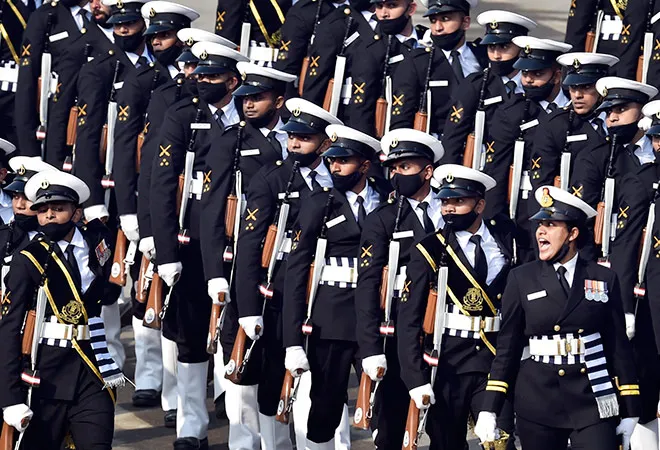-
CENTRES
Progammes & Centres
Location

Image Source: Getty
In the run-up to the Union Budget session on February 1, there was some anticipation that Finance Minister Nirmala Sitharaman would raise the allocation for the defence services. This has been a difficult year for the Indian military, with prolonged Army and Air Force deployments in Ladakh and parts of India’s eastern border, as also an increased tempo of naval operations in the Indian Ocean. Many had hoped that unlike previous years, where the capital allocated had been barely enough to take care of the services’ committed liabilities, this year’s budget would be different.
As it happens, there has only been a paltry increase in the new defence budget. The figures for FY21-22 indicate an allocation of INR 4.78 lakh crore, up from INR 4.71 lakh crore in FY20-21 (including a capital expenditure of Rs 1.35 lakh crore)—an overall hike of just 7.34 percent over last year. The most significant change has been the reduction in defence pensions. As compared to FY20-21, when pensions accounted for INR1.3 lakh crore, this year’s total bill has been reduced to INR 1.15 crore.
While it isn’t clear how the government plans to reduce pensions, finance ministry officials seem not to have accounted for all defence pensions, rolling on some expenditure under the pension head to the next fiscal year. Another possibility is that the finance ministry has factored in Chief of Defence Staff, General Bipin Rawat’s suggestion to reduce pensions of officers opting for premature retirement, a controversial proposal that has invited the disapproval of veterans. Finance officials are unlikely to have accepted the proposal as a done deal, doubtless aware of the reservations of the defence services, as also the adverse impact of the proposal on officer morale. Curiously, however, the government has offered no explanation of how it plans to reduce the defence pension bill by INR 15,000 crores.
Interestingly, the revised estimate for FY20-21 reflects a 23% increase over the budget estimate. Following the crisis in Ladakh last year, the Indian Army is said to have spent about INR 21,000 crore on emergency and unbudgeted defence expenses, procuring equipment and stores from global vendors. The extra funds have been allocated in the revised estimates for the defence ministry. The INR 1.13 lakh crore capital expense in the last budget has been increased to INR 1.34 crore, signifying the large unbudgeted purchase. The Navy and the Air Force too have got INR 10,854 crore and INR 11,774 crore more during the year than what was budgeted respectively (intended possibly to urgently ramp up capability for a conflict with China). Yet, the budget estimate for 2021-22 reflects a decrease over the 20-21 revised figure.
It is hard not to conclude that the defence budget FY21-22 isn’t going to be enough for the military to meet its warfighting requirements. Notwithstanding the 18 percent increase in the capital acquisition budget, which would indeed enable some critical purchases of army weaponry and equipment, the allocations would not be sufficient to meet a two-front challenge from Pakistan and China. For the Navy that has been progressively starved of funds and with cancelled or scaled back programmes initiated over a decade ago, this budget will come as a certain disappointment. The aircraft carrier program (IAC-2) almost certainly won’t be revived anytime this year.
With no significant changes in the defence budget, the services will need to look at other ways to generate funds. One suggestion has been for the defence services to monetize defence land holdings, with the proceeds going into a dedicated fund for modernisation. That, however, might be some distance away from implementation. Another proposal has been for the three services to integrate their defence procurements, which could also take more time to manifest.
The story of India’s military budgetary woes, then, remains unchanged.
The views expressed above belong to the author(s). ORF research and analyses now available on Telegram! Click here to access our curated content — blogs, longforms and interviews.

A former naval officer Abhijit Singh Visiting Fellow at ORF. A maritime professional with specialist and command experience in front-line Indian naval ships he has been ...
Read More +